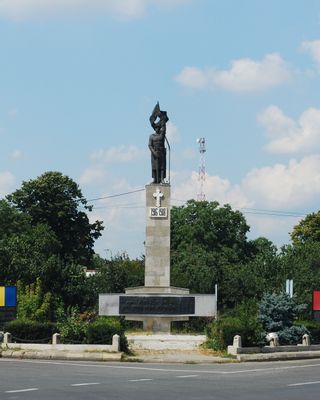This industrial Romanian city was the training ground of Olympic gymnast Nadia Comăneci. Its central square has a modernist monument and the nearby Trotuș River flows through town.
Onești lies where the Trotuș, Cașin, Oituz, and Tazlău rivers meet, framed by green hills in the Tazlău-Cașin Depression of eastern Romania. The city, briefly renamed after communist figure Gheorghe Gheorghiu-Dej, restored its original name in 1996 and maintains its industrial roots alongside a calm Moldavian atmosphere. Begin your visit at Perchiu Hill, home to a steel sculpture honoring poet Mihai Eminescu, or step into the Municipal History Museum to learn about the area’s 15th-century beginnings. After dark, the illuminated Hero Cross on the hill becomes a steady beacon visible across the valley. Olympic gymnast Nadia Comăneci was born here, and the city acts as a starting point for trips into the Eastern Carpathians.
Natural Views and Historical Sites
Perchiu Hill lets you see Onești and the Trotuș Valley from above, with the Hero Cross glowing at night as a reference point. A 20-minute walk up the hill passes the Eminescu monument, where engraved lines from his poems line the base. The Municipal History Museum occupies a former school and explains how the area grew from medieval villages into a planned industrial center during the 1950s. Displays include tools and textiles from Borzești, a nearby village where Prince Stephen the Great built a church in the 15th century. Walk along the Trotuș River’s banks under willow trees, following paths that stretch for kilometers past small bridges and fishing spots.
Festivals and Daily Routines
December 6 brings Onești’s largest event: St. Nicholas Day, marked by parades, carolers, and stalls offering hot cozonac and spiced wine. At the Casa de Cultură a Sindicatelor, Friday nights might feature folk musicians or DJs playing Romanian pop and international hits. The Radu Rosetti Library hosts smaller events like jazz concerts or French plays, often organized by local schools. In May, the TiAmo Festival fills parks with music workshops and puppet shows for families. Visit the Str. Tinereții market on weekends for locally grown apples and pears, or browse stalls with knitted scarves and used novels.
Industry and Transportation
Factories producing chemicals and refining oil drove Onești’s growth in the 1950s, with many workers still employed in these sectors today. A significant number of residents now commute to jobs in Bacău or work abroad, returning for holidays. Plans for the A13 motorway aim to link the city to Brașov, but current travel depends on buses and trains running through Bacău. For groceries, most locals drive to the Metro store near Bacău, as Onești’s Penny Market on Str. Mărășești carries basic supplies. Smaller shops in the center sell items like winter coats or gardening tools, reflecting seasonal demand.
Nearby Villages and Mountain Trails
Slobozia and Borzești, villages within Onești’s administrative area, preserve traditional farming practices and 18th-century wooden churches. Bacău, an hour’s drive northeast, has larger museums like the George Enescu Memorial House and busier shopping streets. Follow the Trotuș River east to reach Târgu Ocna, where salt mines from the 1700s now host spa treatments. Hikers can explore trails in the Eastern Carpathians, passing waterfalls such as Cascada Putreda or old logging routes. Public transport to these areas is sparse, so consider renting a car or booking a day tour from Bacău.
Food and Cafes
Start mornings at a cafe on Str. Mărășești known for its dense hot chocolate and chocolate-covered cherries. Bakeries near the central park bake pretzels and cheese-filled pastries daily, often selling out by midday. For lunch, family-owned eateries around Piața Unirii serve bean soup with smoked pork or chicken stew with polenta. Evening choices are few, but look for food trucks near the Casa de Cultură grilling sausages and serving cold beer on weekends. During summer, ice cream stands pop up along the river, offering flavors like sour cherry and vanilla.












